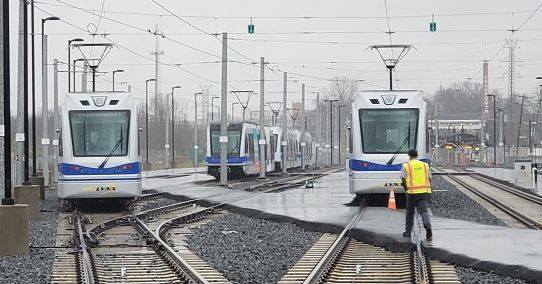Metropolitan Transit Commission: The latest updates and action items

Photo: Paxton Shaw/Social Ape
On Wednesday, May 24, the Metropolitan Transit Commission (MTC) met again to receive an update from CATS CEO Brent Cagle and take action on the Silver Line, fare capping, and the fare policy. The Transit Services Advisory Committee (TSAC) and Citizens Transit Advisory Group (CTAG) also gave brief reports.
Highlights from Cagle’s report:
Risk analysis
CATS intends to perform a risk analysis of service and operations in the department and create resulting mitigating measures. Cagle will provide more information on this as the process moves forward.
Maintenance overhaul
CATS, NCDOT, and Siemens (the manufacturer of CATS’ light rail vehicles) continue to work through the truck overhaul maintenance, though there is no executed contract at this time.
- Phase 1 of this overhaul will include swapping out bearings on the highest mileage vehicles and adding active bearing monitoring systems that are updated in real-time. (NOTE: Charlotte will be the first North American city to deploy these active monitoring systems!)
- Phase 1 will take approximately 12 months to complete.
Administrative issues
CATS received two letters from NCDOT on May 15 and May 16 about administrative failures within the department. New administrative staff are working to resolve these issues. Cagle briefly addressed the recent news about CATS’ General Manager of Rail Lines being placed on administrative leave. Since this is an active human resources matter, he could not share details, but assured the MTC that the interim General Manager is experienced and qualified for the role.
Railyard derailment
Cagle also spoke about the light rail derailment that occurred in the railyard two weeks ago. No passengers were on board, NCDOT was on site immediately after the incident, and a root-cause analysis is underway.
Proposal to sunset the interlocal agreement
Mayor Rusty Knox of Davidson read a statement calling for the creation of a regional transit authority and expediting the sunsetting of the current interlocal agreement that created the MTC as the governing body of CATS. The interlocal agreement is set to expire June 2024.
CATS’ staff presentation
Bus stop improvement
CATS’ Senior Transportation Planner Jason Lawrence provided an informative presentation about bus stop improvements, mainly pointing out that the department needs a prioritized list, strategy, and contract options for bus stop improvements throughout the region. He confirmed that CATS is looking for additional funding through the Charlotte Regional Transportation Planning Organization (CRTPO) and other grants to add shelters and benches, and beautify our stops, perhaps through an “adopt-a-stop” program.
Lawrence also mentioned reducing the number of bus stops in the northern towns because of the microtransit pilot. We are grateful to the TSAC chair, Krissy Oechslin, for noting that fixed-route service is the backbone of public transit. Microtransit can reach riders in low-density areas and neighborhoods where the street network would not allow regular fixed-route service to operate efficiently. However, we’re concerned about proposals to replace existing fixed route service with microtransit. A recent report on microtransit in NC found that a large percentage of trips serve single passengers and are costly on a per-rider basis. The frequency of service CATS provided before the temporary reductions last August was not enough to get riders to their destinations in a time-efficient manner. Cutting service even further could result in the system being less appealing to riders, creating a downward spiral of decreasing ridership.
Cagle remarked that operator numbers are not yet sufficient to cover the full service, but once they are, full service will resume.
Action items
The meeting wrapped with three action item votes:
- MTC unanimously approved the removal of the Amity Gardens station along the proposed Silver Line route. Community members support removal of this station.
- MTC unanimously approved a Fare Capping policy. This means that transit riders who spend $88 or more in one month will automatically receive a monthly pass. Staff analysis shows that this policy will benefit everyone, especially minority customers.
- MTC unanimously approved an update to the Fare Policy. The update will officially add fare capping and modify the University All-Access Pass fare to $25 per student/faculty/staff per semester or $50 per academic year. All accredited colleges and universities are eligible to opt-in.
You can watch the meeting recording here and check out the agenda, which includes CATS’ staff presentations, here.
Thanks for reading!
As a nonprofit, community support is essential for us to keep doing what we do — including providing free articles like this. If you found this article helpful, please consider supporting Sustain Charlotte so we can continue advocating for a better future and working with residents, neighborhood organizations, government agencies, nonprofits, and businesses to solve the most critical challenges to Charlotte’s long-term social, economic, and environmental health.
Want to stay in the loop? Subscribe to our weekly newsletter and follow us on Twitter, Facebook, and Instagram.
